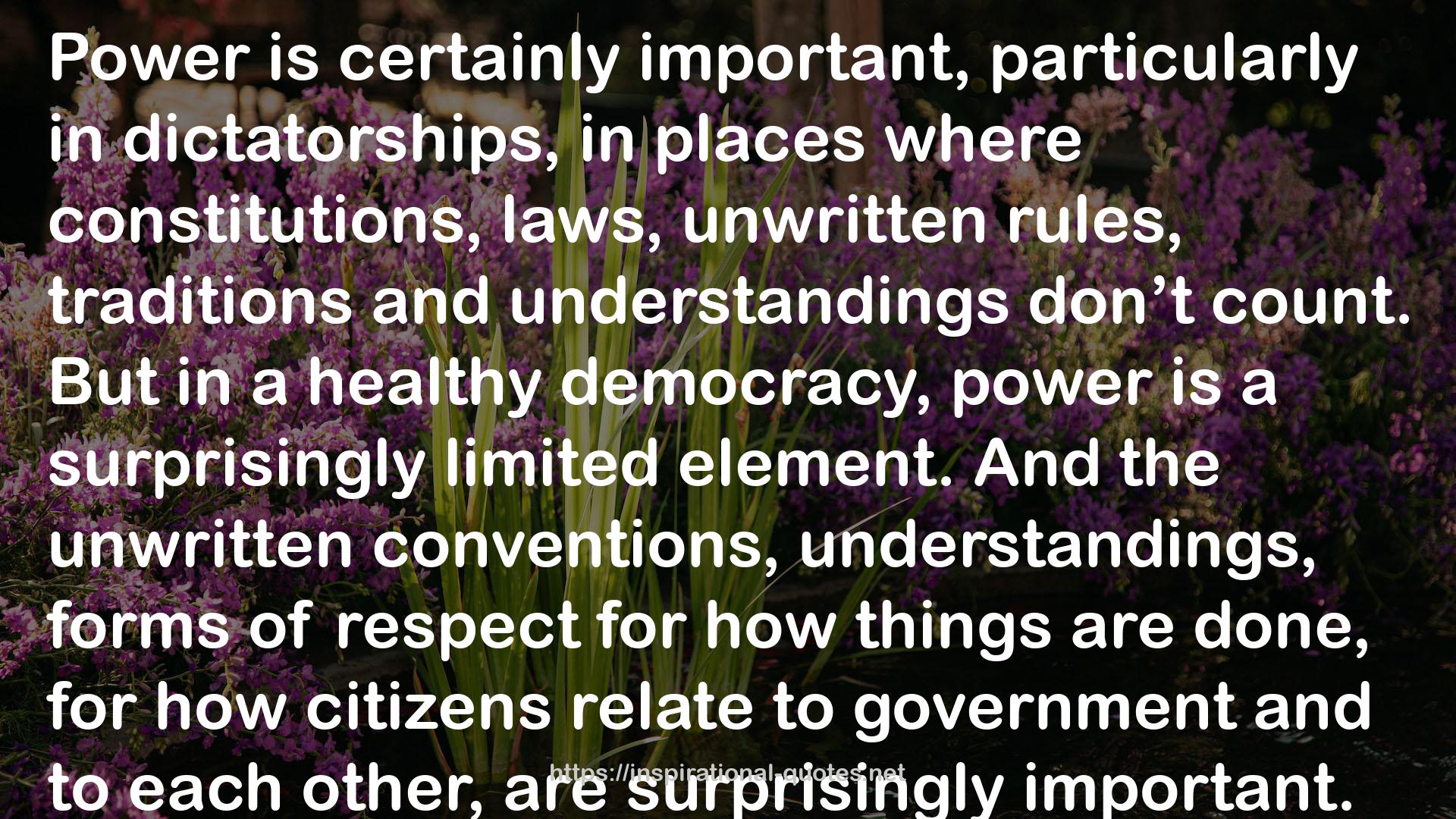1
" Power is certainly important, particularly in dictatorships, in places where constitutions, laws, unwritten rules, traditions and understandings don’t count. But in a healthy democracy, power is a surprisingly limited element. And the unwritten conventions, understandings, forms of respect for how things are done, for how citizens relate to government and to each other, are surprisingly important. Why? Because if democracy is only power, then what we are left with is a system of deep distrust. Why? Because if only power matters – even if it is the result of an election – then the government feels that it has a mandate to do whatever it wants; that the law is there principally to serve power. If democracy is only about winning power and using it, then it has been deformed into a denial of society and of the idea of responsible citizenship. "
― John Ralston Saul , The Comeback
5
" Power is certainly important, particularly in dictatorships, in places where constitutions, laws, unwritten rules, traditions and understandings don’t count. But in a healthy democracy, power is a surprisingly limited element. And the unwritten conventions, understandings, forms of respect for how things are done, for how citizens relate to government and to each other, are surprisingly important. Why? Because if democracy is only power, then what we are left with is a system of deep distrust. Why? Because if only power matters – even if it is the result of an election – then the government feels that it has a mandate to do whatever it wants; that the law is there principally to serve power. If democracy is only about winning power and using it, then it has been deformed into a denial of society and of the idea of responsible citizenship. And that is the increasingly common characteristic of government, even in democracies. Only power matters. This is partly the outcome of government being de-intellectualized. "
― John Ralston Saul , The Comeback
6
" Canada is now the oldest continuous democratic federation in the world, in good part because most of our leaders, and certainly the best ones, have respected most of these written and unwritten rules. Other countries – almost all our allies and friends – have suffered civil wars, coups, dictatorships, sharp breaks, because they could not maintain the flexibility and respect for the Other that these rules, in particular the unwritten rules, create. "
― John Ralston Saul , The Comeback
10
" our government is still breaking our treaty obligations. If you coolly strip away the endless administrative rhetoric about budgets and governance, the endless studies and the endemic lack of broad policies coming from the Department of Indian Affairs, you begin to realize that we are still caught up in the racist assimilation policies of a century ago. Let me take a broader example. We all know that the treaties involved a massive loss of land for First Nations. What most of us pretend we don’t know is that this remarkable generosity was tied to permanent obligations taken on by colonial officials, then by the Government of Canada; that is, by the Crown; that is, by you and me. So we got the use of land – and therefore the possibility of creating Canada – in return for a relationship in which we have permanent obligations. We have kept the land. We have repeatedly used ruses to get more of their land. And we have not fulfilled our side of the agreement. We pretend that we do not have partnership obligations. It’s pretty straightforward. We criticize. We insult. We complain. We weasel. Surely, we say, these handouts have gone on long enough. But the most important handout was to us. Bob Rae put it this way at the Athabasca Chipewyan First Nation Treaty Conference in June 2014: “It’s ridiculous to think people would say: ‘I have all this land, millions and millions and millions of acres of land, I’m giving it to you for a piece of land that is five miles by five miles and a few dollars a year.’ To put it in terms of a real estate transaction, it’s preposterous. It doesn’t make any sense.” So the generosity was from First Nations to newcomers. And we are keeping that handout – the land – offered in good faith by friends and allies. "
― John Ralston Saul , The Comeback

